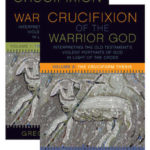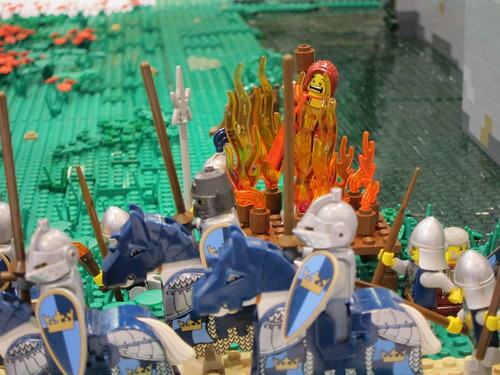We run our website the way we wished the whole internet worked: we provide high quality original content with no ads. We are funded solely by your direct support. Please consider supporting this project.
Why Greg Can’t be Accused of Marcionism (Let’s Not Burn Him at the Stake Just Yet)
Kristin Brenemen via Compfight
Richard Beck posted a blog today entitled It’s the Same God: On Marcionism, Creeds, Hermeneutics and War. You’re going to want to take the time to read through it in its entirety. Greg has been accused of Marcionism quite a lot as a result of the working out of his Cruciform Thesis. But while Marcion basically threw out the Old Testament, claiming that it portrayed a different God than Jesus shows us, Greg has insisted that the Old Testament is inspired, as Jesus clearly believed. So how do we resolve the tension between the portrayal of God we find in the Old Testament and the revelation of God we find in Jesus? That’s the hermeneutical conundrum that Greg has been working on for the last several years.
We’ll let you know when we have a publication date for Crucifixion of the Warrior God. It’s gonna be awesome! In the mean time, here’s a snippet from Richard Beck’s blog post.
We can see, now, the shape of the Marcion accusation toward pacifists. When pacifists pit Jesus against YHWH in the Old Testament they are of accused of Marcionism because, as the creeds tell us, “it’s the same God.” The assumption being that you can’t use Jesus to say that God is always, unequivocally against war. Because, clearly, God isn’t against war in the Old Testament. So God can’t always be against war because, again, “it’s the same God.” To suggest otherwise is to flirt with the Marcion heresy.
So that’s the argument. But I’d like to draw attention to the bait and switch going on.
Basically, the thing to note is this. The claim “it’s the same God” is, as we’ve seen, aconfessional rather than a hermeneutical assertion. More precisely, the confession “it’s the same God”–“We believe in one God, the Father Almighty, Maker of heaven and earth”–hands us a hermeneutical conundrum.
The confessional statement “it’s the same God” creates rather than solves the hermeneutical problem.
Category: General
Tags: Crucifixion of the Warrior God, Cruciform Theology, Hermeneutics, Marcionism, Pacifism, Richard Beck, War
Related Reading

The Cross Above All Else
The way to know what a person or people group really believes is not to ask them but to watch them. Christians frequently say, “It’s all about Jesus,” but our actions betray us. Judging by the amount of time, energy, and emotion that many put into fighting a multitude of battles, ranging from the defense…

Crucifixion of the Warrior God Update
Did you know that authors generally don’t have much say-so about the cover art for their books? It’s considered part of the marketing, so the author may or may not like how it ends up looking. I’ve had a few book covers that made me scratch my head. (I won’t tell you which ones, but it would…

The Entire Old Testament is About Jesus
Jesus himself taught that he carried more authority than any prophet that predated him. Though Jesus regarded John as the greatest prophet up to himself (Matt 11:11), he claimed his own “testimony” was “weightier (megas) than that of John” (Jn. 5:36). Jesus certainly wasn’t denying John or any previous true prophet was divinely inspired. But…

Early Anabaptists and the Centrality of Christ
In a previous post, I wrote about the Christocentric interpretation of the Scriptures espoused by the magisterial Reformers, specifically Luther and Calvin. Their hermeneutic was focused on the work and the offices of Christ, but in my opinion the Anabaptists surpasses their approach because it focused on the person of Christ with an unparalleled emphasis…

The Phinehas vs. Jesus Conundrum
I’ll be frank. This is not a blog that will be easy for some people to read. But it’s a blog I believe every follower of Jesus should read – even if you have to force yourself to press on. It’s about something we all wish was not true. It’s about the way the Bible…

Does the Author of Hebrews Condone Capital Punishment? A Response to Paul Copan (#12)
In his critique of Crucifixion of the Warrior God (CWG), Paul Copan argues that several New Testament authors condone capital punishment as directly willed by God. The most challenging for my thesis, in my estimation, is Hebrews 10:26-29, which reads: For if we willfully persist in sin after having received the knowledge of the truth,…

